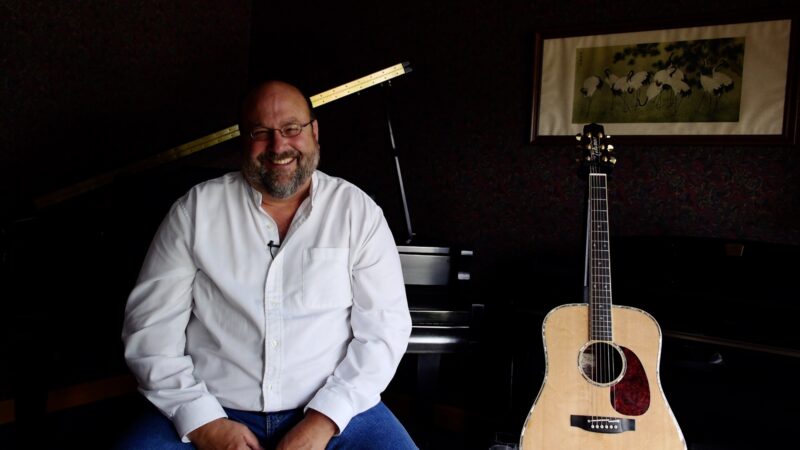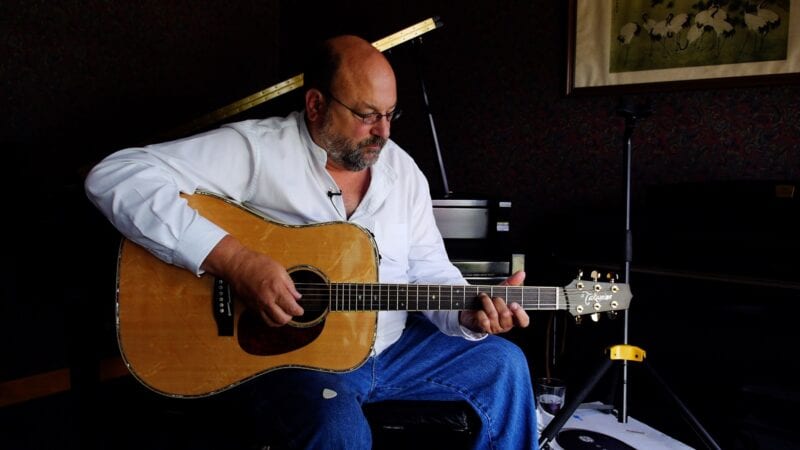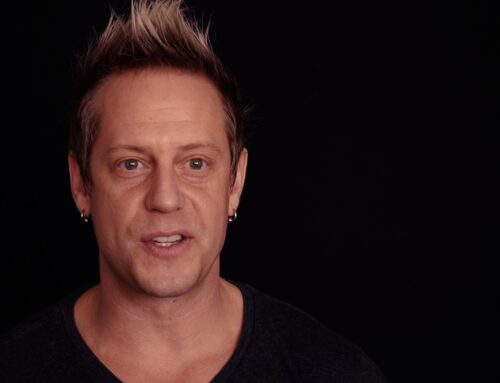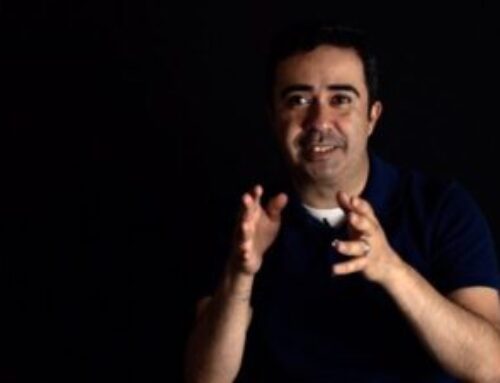MICHAEL RETZINGER
I will always be grateful to Kevin Eldridge for two reasons. First off, I appreciated his willingness to participate in the film. As an unknown filmmaker, I would have understood any apprehension to divulge the deep impact stuttering had in his life. Secondly, he introduced me to his good friend Michael Retzinger (affectionally known as “Retz”). This introduction may be one of the most pleasant surprises I encountered on the journey toward making WHEN I STUTTER.
When you meet Retz, you realize that he is GENUINE through and through. He speaks his mind unabashedly and unapologetically. Not only was he completely vulnerable and honest in his interview, but he also left me with some profound ideas about stuttering that changed the way I thought about the subject. When Retz talks about stuttering he is clearly motivated by passion (LOTS of it) and love.
Like so many of the participants in WHEN I STUTTER, there is not enough of Retz in the film. It was hard to narrow down exactly which part of his story I wanted to tell. One of the sections I chose was Retz talking about his experiences with bullying when he was younger. Bullying is a subject that has always occupied a special place in my heart because it’s something that I dealt with for much of my childhood. Retz’s thoughts on bullying and the imperative nature of one “responding” to it was something I had never seen talked about in such an earnest way. I’m very proud to have every word of it in my film…
Retz and I exchange phone calls every few months and he always congratulates me on the film’s success and encourages me to keep getting it out there. The phone calls always include some passing along of sage wisdom from him to me and many, many laughs. I’m honored to call him a friend. One last thing… Retz is a talented musician and you heard some of his original song “Harmony” in WHEN I STUTTER. The entire piece is quite beautiful and I recommend watching an extended cut of the entire performance HERE.
“Engage in activities with others that are fun; you run the risk of increasing your amount of talking – even if you stutter.”
What has been the response from others about you in the film?
There have been a few people who have contacted me after watching “When I Stutter” at one of the award-winning film festivals or university showings that John Gomez has undertaken to show the documentary. The comments I’ve received have all been very positive not only about me, but about the message of the documentary. My friend – Kevin Eldridge – and I have talked many times about how this documentary should be a necessary part of any university or professional organization training program for professionals wanting the privilege of working with those of us who stutter.
What was your favorite or most memorable part of the process of making the film?
Gee, this is a tough question…I mean, it was all good. When we all met at Kevin’s house it was like we were meeting a big-league movie maker Mongol!!! I mean meeting John was the total bomb. It was apparent right from the start that this was gonna be something special, different and with a ton of potential, positive impact. John’s questions and ability to really engage in empathetic listening and his filming techniques were astounding. And the space he created for both Kevin and I to be real about each of our stuttering experiences allowed both of us to be authentic and emotionally open in our responses. Even now as I write this, I recall quite vividly just watching my friend Kevin open the suitcase labeled “My Life with Stuttering” and the human rainstorm that commenced in me as he took out his contents of that suitcase. John’s skills at listening and drawing out what was so emotionally embedded in each of us was something I’ll never forget…and will be forever grateful for.
What has surprised you about the film since it was first presented?
The biggest surprise – and major disappointment to me – has been the unwillingness for the most part – of the professional world – you know, ASHA, the SFA, all the specialty groups in each – to embrace and acknowledge the truths about the devastating effects of stuttering and – indirectly – the dismal outcomes of current “therapy” regimens for those of us who stutter. Individual professionals may embrace the film message, but the professional organizations fall far short of doing so, and their refusal to admit the truths revealed in “When I Stutter” speaks volumes. (Hell, ASHA does not even require course work or clinical practicums in fluency disorders for those individuals pursuing an undergraduate or masters level degree, and yet allows, expects and endorses SLP’s to “treat” those of us who stutter (How’s that going ASHA? What a cruel joke perpetrated on those of us who stutter seeking treatment…)
What’s changed in your life since we saw you in the film?
What has changed in my life? By far – and the best and biggest change – is the opportunity to build a most enjoyable relationship with my friend, John Gomez! HE B DAH MAN DOIN’IT2IT HEAVY D STYLE 2 DAH MAXIMUS!
What’s your relationship with stuttering now?
I don’t give a shit about my stuttering…IDGAS Rules in all aspects of my talking and/or stuttering. Through my eyes, STUTTERING IS A LISTENER DISORDER… I also believe in my heart of hearts that it is the responsibility of we adults who stutter to educate the professional “experts” in the field of stuttering about the disorder of stuttering and the devastation stuttering inflicts on a life – and families – and the need for UNBIASED research in the field for developing effective treatment. The speech part of stuttering is just a symptom of the disorder – just the tip of the iceberg – and the professional world “talks” about it but does NOTHING…, NADA… to prevent or effectively treat it…Nothing! Children who stutter and their parents should not be subject to the current “state of the art” therapy methods – the negative risks are too big to take IMHO. Parents need to be actively involved in the treatment process. The professional world has been unwilling to admit that the current “therapy” options risk increasing the severity of stuttering in children and adults who stutter to the point where the one who stutters – a child or adult – makes the conscious decision to choose the ultimate stuttering behavior – CHOSEN SILENCE. (I really believe the vast majority of those treating stuttering view this as “the cure”… And again, there are those who will say I’m jaded and skewed… but I’m not…I’m a truth-teller…)
What’s some advice for people who are on their journey with stuttering?
This is easy for me to answer – If you are a parent of a child who stutters, I encourage you to read a book authored by Dori Holte, a mother of a child who stutters, titled “VOICE UNEARTHED – Hope, Help and a Wake-Up Call for Parents of Children Who Stutter” BEFORE starting any type of “speech therapy”. As a parent of a CWS, you will make better decisions regarding the type of therapy you choose for your child. 2nd, have the therapist you are choosing to work with your child run their therapy techniques on you before they inflict your child with the techniques – Parent, use those techniques for 1 week, every day and every time you open your mouth to talk…You will then know if these techniques will be helpful and beneficial for your CWS. (IMHO – you are risking – a high, probable risk – of chosen silence if you allow techniques to be used in any approach to therapy with a child.) Find a therapy that will increase talking and decrease communication apprehension…you know, the fear of talking and the fear of stuttering. And demand and get yourself involved in the therapy process.
And if you an adult who stutters – Man, it’s your life, your speech and it’s your decision about how you want to address your stuttering. I started therapy at the age of 3. I’ve had many different types of therapy from the age of 3 to 17…Domain Delecato Method, fluency training, fluency shaping, stuttering modification, a hybrid of fluency training and stuttering modification, DAF and drug therapy (both Dr. prescribed and self-prescribed…) And at 17, after all of these “therapies”, my stuttering was so severe that I chose silence. What a world of pain and hurt I was in – fubar’ed – as a result of technique based “therapy”. If you’re an adult who stutters, you will understand the darkness you risk increasing with therapy “techniques”. The question to ask yourself is this — Are you willing to risk the increase in communication apprehension – you know, the fear of stuttering & the fear of talking – by using techniques to stop or control your stuttering? To me, it ain’t worth that…
You do what you think is best, but if you ask me, find a therapist and therapy that will help you address the following: We who stutter can already speak freely at times…Goal # 1. Engage in activities with others that are fun; you run the risk of increasing your amount of talking – even if you stutter. (You run the risk of talking more if you talk more…Got it?) 2. You will need help figuring out how to decrease your acquired communication apprehension – you know, the fear of talking, the fear of speaking and the fear of interacting. The more technique-based therapy you’ve had, the greater the increase of communication apprehension you will acquire. Give up the notion of stopping or modifying your stuttering; if that’s your goal, it’s easily solved…Chosen silence. But if talking more – even if you stutter – and not having the fear of talking or stuttering is your goal, it can be done. It has been my personal and professional experience that if a PWS engages in talking therapy as well as making a major part of the therapy focus on decreasing the fear of talking, decreasing the fear of stuttering and decreasing the fear of interacting, you risk vast amounts of your natural speech being released.
Another way of saying this is you must develop the real attitude of IDGAS – I DON’T GIVE A SHIT – about talking or stuttering. When you truly acquire this, I can guarantee you will release greater volumes of your natural speech, and stuttering will greatly and significantly decrease. It takes a gifted therapist to help one do this, and you will have to find one; they ain’t out there looking for you. And you will have to convey to the therapist what you want to do. It’s your life and your speech and your stuttering. OK…Nuff Said.
Purchase WHEN I STUTTER to watch
Retz and 18 other compelling individuals
talk about their journey with stuttering.








